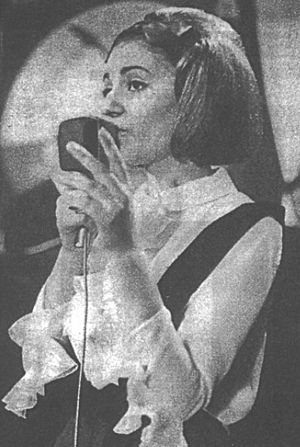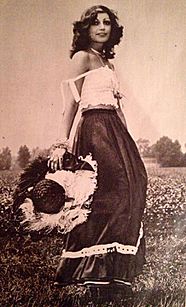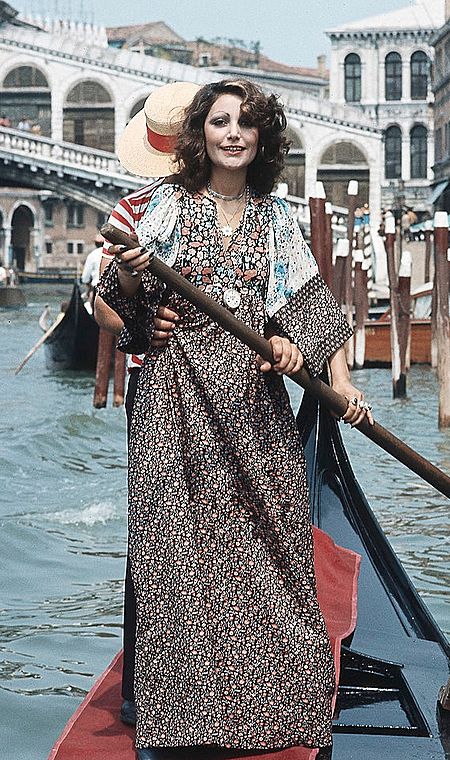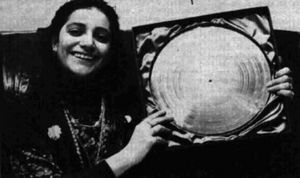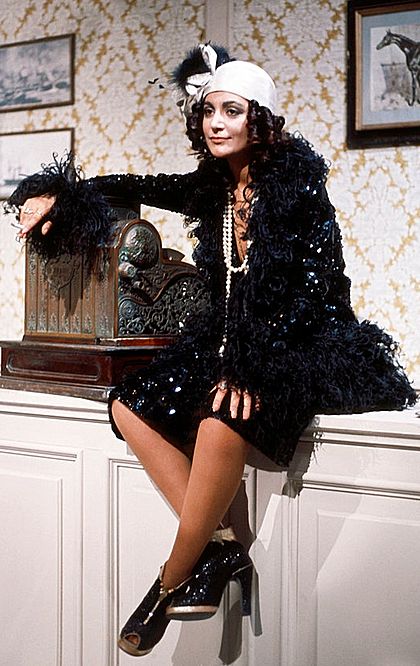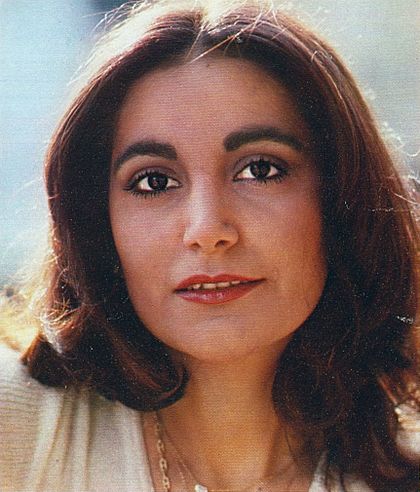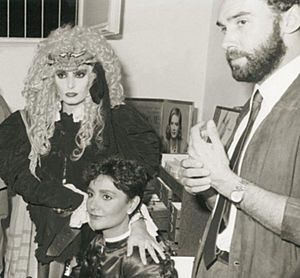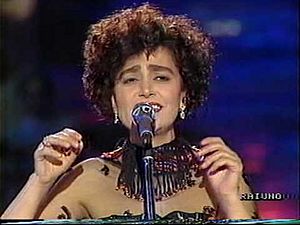Mia Martini facts for kids
Quick facts for kids
Mia Martini
|
|
|---|---|
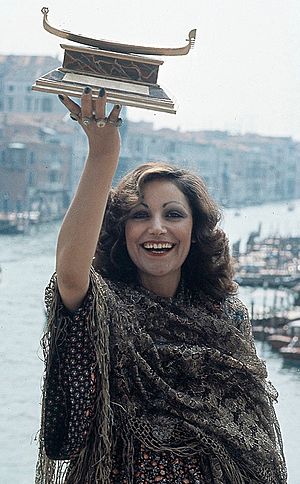
Mia Martini in Venice in 1973, holding the Gondola d'Oro prize won with her song "Donna sola"
|
|
| Background information | |
| Birth name | Domenica Rita Adriana Bertè |
| Also known as | Mimì Bertè |
| Born | 20 September 1947 Bagnara Calabra, Reggio Calabria, Italy |
| Died | 12 May 1995 (aged 47) Cardano al Campo, Varese, Italy |
| Genres | Pop, Blues, Jazz, Pop rock, Canzone Napoletana, Folk music |
| Occupation(s) | Singer, songwriter, musician |
| Years active | 1963–1983 1989–1995 |
Mia Martini (born Domenica Rita Adriana Bertè on September 20, 1947 – May 12, 1995) was a famous Italian singer, songwriter, and musician. Many experts believe she had one of the most important and expressive female voices in Italian music. She was known for her strong performances and soulful singing.
Her first album, Oltre la collina, with the song "Padre davvero", is considered one of the best Italian albums by a female artist. Songs like "Piccolo uomo", "Donna sola", "Minuetto", and "La costruzione di un amore" made her very popular in Italy and worldwide in the 1970s. She is the only female artist to win the Festivalbar music competition two times in a row, in 1972 and 1973.
In 1982, she sang "E non finisce mica il cielo" at the Sanremo Music Festival. She won the Critics Award, which was created just for her amazing performance. After she passed away, this award was named the "Mia Martini" Critics Award.
In 1983, she had to stop singing for a while because of false rumors. Some people in the music business unfairly thought she brought bad luck. This kept her away from music for seven years. But in 1989, she made a big comeback at the Sanremo Music Festival with "Almeno tu nell'universo", which brought her new success.
Mia Martini also represented Italy twice at the Eurovision Song Contest. She sang "Libera" in 1977 and "Rapsodia" in 1992. She passed away on May 12, 1995, at the age of 47.
Contents
Mia Martini's Life Story
Early Years and Family
Domenica Rita Adriana Bertè was born in Bagnara Calabra, Reggio Calabria, in southern Italy. This was on September 20, 1947. She was the second of four daughters. Her older sister was Leda, and her younger sisters were Loredana and Olivia.
Mia's father, Giuseppe Radames Bertè, was a teacher of Latin and Greek. Her mother, Maria Salvina Dato, was an elementary school teacher.
"Mimì," as she was nicknamed, grew up in Porto Recanati. She loved music from a young age. She started singing at parties and dance halls. She also entered singing contests for new voices. In 1962, she convinced her mother to take her to Milan for an audition. She hoped to get a record deal.
Starting as Mimì Bertè
A music producer named Carlo Alberto Rossi was the only one who gave her a chance. He decided to help her become a yé-yé singer, which was a popular style then. In 1963, at 16, Mimì Bertè recorded her first song.
In May 1964, she won the Bellaria Festival with "Come puoi farlo tu." She also gained some attention with "Il magone" and "Ed ora che abbiamo litigato."
After her parents separated, she moved to Rome with her mother and sisters. She tried to restart her career by forming a trio with her sister Loredana and her friend Renato Fiacchini (who later became Renato Zero). They also worked small jobs to earn money.
In 1970, she sang as a backup singer with her sister Loredana. She worked on an album by Chico Buarque de Hollanda. Later that year, a pianist named Toto Torquati encouraged Mimì to perform live. He helped her find songs that suited her voice.
Becoming Mia Martini
Finding Her New Name
A meeting with music producer Alberigo Crocetta changed everything. He was the founder of the famous Piper Club, where many artists performed. He decided to help Mimì Bertè become a star. He also thought about the international music market. So, he created her stage name: "Mia Martini." Mia was inspired by her favorite actress, Mia Farrow. Martini was chosen because it was one of the most famous Italian words abroad. Her style also became unique, with many rings and a special bowler hat.
In 1971, the record company RCA Italiana released "Padre davvero," her first song as Mia Martini. The song was about a conflict between a father and daughter. It was immediately seen as "disrespectful" by radio and TV censors. Still, she won the Festival di Musica d'Avanguardia e Nuove Tendenze in Viareggio.
Her first album, Oltre la collina, came out in November 1971. It is considered one of the best albums ever made by an Italian female artist. It was also one of the first concept albums in Italy.
Big Hits: "Piccolo uomo" and "Minuetto" (1972–1973)
When her producer Alberigo Crocetta moved to the record company Ricordi, Mia Martini followed him. She recorded "Piccolo uomo." This song was written by Bruno Lauzi and Michelangelo La Bionda.
"Piccolo uomo" was played many times on Italian radio. Mia Martini sang it at the Festivalbar and won her first victory. Her success was immediate. She appeared on TV shows, and the song became a top hit. It earned her first Gold Record.
In September, Mia Martini sang "Donna sola" at a music festival in Venice. This song had strong soul influences. It sold about 270,000 copies. The next year, she won the prestigious Gondola D'Oro award for it.
In October, she released her second album, Nel mondo, una cosa. It included songs like "Valsinha" and covers of songs by John Lennon and Elton John. The album sold around 300,000 copies. It won the Record Critics Award for the best album of 1972.
In 1973, her hits "Piccolo uomo" and "Donna sola" were released in Germany. She appeared on TV shows in France and Spain. Critics called her "the queen of youth music in Italy."
On April 2, Mia Martini recorded "Minuetto." This song was composed by Dario Baldan Bembo with lyrics by Franco Califano.
"Minuetto" became her best-selling song. She earned another Gold Record and a platinum record for it. She also won Festivalbar for the second time in a row. The song stayed in the top ten for 22 weeks and reached number one. It was one of the most successful songs of 1973.
By the end of 1973, she was the female singer who had sold the most records that year, along with Ornella Vanoni and Patty Pravo.
European Success (1974-1975)
In 1974, European critics considered Mia Martini the singer of the year. Her songs were released in many countries. She recorded her hits in French, German, and Spanish.
Her album È proprio come vivere was released in April 1974. It included "Agapimu" ("My love"), which had Greek lyrics written by her.
The songs "Inno" and "...E stelle stan piovendo" became major hits in the summer of 1974. They were both released on the same single.
È proprio come vivere was one of the most successful albums of 1974. It sold around 300,000 copies. In October, she received a Gold Record for selling over one million records with her last three albums.
At the end of the year, she recorded her first TV special called Mia. In December, she co-hosted a radio show called Ciao domenica.
Mia Martini won the European Critics Award in Palma de Mallorca for her song "Nevicate." This song was on her album Sensi e controsensi (1975).
In the summer of 1975, she released "Donna con te," which was a popular song. She was also named the best female singer of the year by a popular magazine.
Challenges with Her Record Label (1975-1976)
Mia Martini's success led to problems with her record label, Ricordi. They pressured her to record songs they chose. She felt this limited her artistic freedom, but her contract bound her. Despite this conflict, her album Un altro giorno con me was one of her best-selling.
In 1976, she was asked to perform at the Sanremo Festival again but changed her mind. Her last official song with Ricordi was released in March.
Later, the record company RCA offered Mia Martini a contract that gave her more freedom. She had been thinking about changing labels for a while. So, she left Ricordi early.
Her new album with RCA, Che vuoi che sia... se t'ho aspettato tanto, included songs by new artists like Mango. For the album's launch, national TV produced a special show. Mia Martini performed on Italian and international stages.
However, Mia Martini was sued by Ricordi for breaking her contract. The record company demanded that her new album be removed from the market and that she pay a large amount of money.
In 1977, in a TV concert in France, Mia Martini caught the attention of Charles Aznavour. He was impressed by her powerful singing. The French singer asked her to perform with him in Europe.
That same year, Mia Martini represented Italy at the Eurovision Song Contest with "Libera." She finished 13th. She later said she didn't like the updated version of the song and preferred the original.
She also recorded "Per amarti," one of her most famous songs. She released an album with the same title, Per amarti. On this album, she worked for the first time with songwriter Ivano Fossati. They started an artistic and personal partnership.
The album Per amarti also included "Ritratto di donna." Mia Martini sang this song at the World Popular Song Festival in Tokyo in 1977. She placed second and won an award for her outstanding performance.
On January 10, 1978, she performed successfully with Aznavour at the Olympia in Paris. However, she decided not to continue the tour to stay with Fossati. Because of this, her plans to record an album with Aznavour did not happen.
Mia Martini then had disagreements with RCA. She accused the label of trying to stop her work. She moved to Warner Bros. Records. This company was willing to help her with her debts from her previous contract. Her first single with Warner was "Vola," written by Ivano Fossati. This led to a bigger collaboration with Fossati on her album Danza. Songs like "La costruzione di un amore" became very popular.
1980s
From Singer to Songwriter
In 1981, after a year of not singing, Mia Martini decided to present herself as a songwriter. She released the album Mimì. It had ten songs she wrote herself. She also competed at the Festivalbar with "Ti regalo un sorriso." The album was well-received, even with some difficulties in promoting it.
In 1982, Mia Martini sang at the Sanremo Music Festival for the first time. She sang "E non finisce mica il cielo," written by Ivano Fossati. She won the Critics' Prize, which was created just for her. After her death, this award was named the "Mia Martini" Critics Award.
That same year, she wrote Quante volte, a soft-funk song. Her album Quante volte... ho contato le stelle sold over 70,000 copies. The album also included other songs written by Mia Martini, like "Stelle."
Stepping Away from Music
In 1983, Mia Martini left the music scene. False rumors had spread for ten years, linking her to bad luck. In the music industry, some people even avoided saying her name.
Mia Martini held a farewell concert in Milan. She recorded the album Miei compagni di viaggio there. In this album, she sang songs by artists she admired, like John Lennon and Fabrizio De André. The concert ended with a song by Chico Buarque.
Her record company tried to get her to participate in the Sanremo Music Festival in 1985 with "Spaccami il cuore." But the song was not chosen for the festival.
Mia Martini, feeling isolated and affected by the end of her relationship with Fossati, moved to the countryside. To help with money problems from her past legal disputes, she continued to perform in small towns.
Return to Sanremo
In 1989, music producer Gianni Sanjust helped Mia Martini return to the music stage. She signed with Fonit Cetra, a record label willing to work with her.
Sanjust found an old song written for her in 1972: "Almeno tu nell'universo." The song was first rejected for the contest. But thanks to some important people, it was allowed to compete at the 39th Sanremo Festival. Mia Martini's performance brought her new success and she won the Critics Award for the second time.
After her success at Sanremo, Mia Martini went on tour and recorded a new album called Martini Mia.... It included "Notturno" and "Donna." "Donna" was written by Enzo Gragnaniello as a tribute to her. This started a collaboration that lasted for several years.
In the summer of 1989, Mia Martini sang "Donna" at Festivalbar. She received a Gold Disc for selling 100,000 copies of her album. In the autumn, she won the Targa Tenco as the best female singer of the year.
1990s
New Successes and Eurovision
In 1990, Mia Martini competed again at the Sanremo Music Festival with "La nevicata del '56." She won the Critics Award for the third time.
"La nevicata del '56" was on her album La mia razza. This album featured different music styles, from melodic songs to ethnic rhythms.
In 1991, Mia Martini released "Mi basta solo che sia un amore," a collection of her love songs. She also held concerts where she sang her own songs and jazz versions of others.
At the end of 1991, Mia Martini sang a duet with Roberto Murolo called "Cu' mme." This song, written by Enzo Gragnaniello, became a big hit.
In 1992, she competed for the fourth time at the Sanremo Music Festival with "Gli uomini non cambiano." She was a favorite to win but came in second place. Her new album Lacrime became a gold record.
Her second-place finish at Sanremo allowed her to represent Italy again at the Eurovision Song Contest in Sweden. She sang "Rapsodia" and placed 4th.
In April 1992, Mia Martini reconnected with her sister Loredana Bertè after almost ten years. They had not spoken since 1983. In 1993, Mia Martini sang a duet with Loredana, "Stiamo come stiamo," at the Sanremo Music Festival.
Last Album and Passing
In 1994, Mia Martini moved to a new record company, RTI Music. She finished recording her last album there. The album was called La musica che mi gira intorno. In it, she sang songs by her favorite writers, including Fabrizio De André and Ivano Fossati.
This album was meant to be the first of many projects where she would reinterpret different musical styles. She planned to sing Neapolitan classics, songs by Pino Daniele, and tributes to artists like Tom Waits and Billie Holiday.
In March 1995, two months before she passed away, Mia Martini announced plans for a new album about the moon. She also planned a duet with the singer Mina in 1996. After Mia Martini's death, Mina dedicated a song to her on her album Pappa di latte.
A few days before her death, Mia Martini was rushed to the hospital twice due to stomach and arm pain. These symptoms were not taken seriously by those around her.
After a concert, Mia Martini decided to rest. She traveled to Cardano al Campo, near her father's house, as their relationship had improved. She passed away there on May 12, 1995.
Her funeral took place on May 16 in Busto Arsizio. About four thousand people attended. Her coffin was covered with a flag of Napoli, the football team she supported. Her body was cremated, and her ashes were buried in the cemetery of Cavaria con Premezzo.
Biopic Film
In 2019, a movie about Mia Martini called Io sono Mia was released. The film was directed by Riccardo Donna. Serena Rossi played Mia Martini. The movie tells the story of Mia Martini's life, including her music career, her family relationships, and the unfair treatment she faced in the music industry.
The film starts in 1989 in Sanremo. It uses flashbacks to show important moments in Mia Martini's life. These moments are told during an interview she gives a journalist before her performance at the Sanremo Music Festival in 1989.
The movie shows her early start in music, her success in the 1970s, and when she had to leave the music world. It explains how false rumors started in the late 1970s. These rumors accused Mia of bringing bad luck. Because of this, she was avoided by many in the music industry. She moved to the countryside and struggled to make a living. The movie also shows her difficult love story with a photographer, who was inspired by songwriter Ivano Fossati.
Awards and Achievements
- 1964: Won "Festival di Bellaria" with Il magone
- 1971: Won "Festival di Musica d'Avanguardia e Nuove Tendenze" in Viareggio with Padre davvero
- 1972: Won "Premio della critica discografica" (Record Critics Award) for album Nel mondo, una cosa
- 1972: Won Festivalbar 1972 with Piccolo uomo
- 1972: Received Gold Record for Piccolo uomo
- 1972: Won Mostra Internazionale di Musica Leggera in Venezia with Donna sola
- 1973: Won Festivalbar 1973 with Minuetto
- 1973: Received Gold Record for Minuetto
- 1974: Received Gold record for over 1 million sales
- 1975: Won Critics Award "Premio della Critica di Palma de Mallorca" with Nevicate
- 1975: Won "Premio de Il canzoniere dell'estate" as best singer of the year
- 1975: Won Telegatto as best female singer of the year
- 1977: Won the Most Outstanding Performance Award at the "World Song Popular Festival Yamaha in Tokyo" with Ritratto di donna
- 1982: Won Critics Award at Sanremo Music Festival with E non finisce mica il cielo
- 1989: Won Targa Tenco as best performing artist
- 1989: Won Critics Award at Sanremo Music Festival with Almeno tu nell'universo
- 1989: Won Telegatto as best female singer of the year
- 1989: Received Gold Record for Martini Mia...
- 1990: Won Critics Award at Sanremo Music Festival with La nevicata del '56
- 1992: Second Place at Sanremo Music Festival
- 1992: Received Gold Record for Lacrime
Discography
As Mimì Bertè
Singles
- "I miei baci non puoi scordare" / "Lontani dal resto del mondo" (1963)
- "Insieme" / "Let me tell you" (1963)
- "Il magone" / "Se mi gira l'elica" (1964)
- "Ed ora che abbiamo litigato" / "Non pentirti dopo" (1964)
- "Non sarà tardi" / "Quattro settimane" (1966)
- "Coriandoli spenti" / "L'argomento dell'amore" (1969; released in 2000 as part of compilation Mia... Mimì)
As Mia Martini
Singles
- "Padre davvero..." / "Amore... amore... un corno!" (1971)
- "Gesù è mio fratello" / "Lacrime di marzo" (1971)
- "Credo" / "Ossessioni" (1972)
- "Piccolo uomo" / "Madre" (1972)
- "Donna sola" / "Questo amore vero" (1972)
- "Minuetto" / "Tu sei così" (1973)
- "Inno" / "...E stelle stan piovendo" (1974)
- "Al mondo" / "Principessa di turno" (1975)
- "Donna con te" / "Tutti uguali" (1975)
- "L'amore è il mio orizzonte" / "Sabato" (1976)
- "Che vuoi che sia... se t'ho aspettato tanto" / "Io donna, io persona" (1976)
- "Libera" / "Sognare è vita" (1977)
- "Per amarti" / "Se finisse qui" (1977)
- "Vola" / "Dimmi" (1978)
- "Danza" / "Canto alla luna" (1979)
- "Ti regalo un sorriso" / "Ancora grande" (1981)
- "E ancora canto" / "Stai con me" (1981)
- "E non finisce mica il cielo" / "Voglio te" (1982)
- "Quante volte" / "Solo noi" (1982)
- "Bambolina" / "Guarirò guarirò" (1982)
- "Spaccami il cuore" / "Lucy" (1985)
- "Almeno tu nell'universo" / "Spegni la testa" (1989)
- "La nevicata del '56" / "Danza pagana" (1990)
- "Stiamo come stiamo" (with Loredana Bertè) / "Dormitorio pubblico" (L. Bertè) (1993)
Albums
- Oltre la collina (1971)
- Nel mondo, una cosa (1972)
- Il giorno dopo (1973)
- È proprio come vivere (1974)
- Sensi e controsensi (1975)
- Un altro giorno con me (1975)
- Che vuoi che sia... se t'ho aspettato tanto (1976)
- Per amarti (1977)
- Danza (1978)
- Mimì (1981)
- Quante volte... ho contato le stelle (1982)
- Miei compagni di viaggio (1983)
- Martini Mia (1989)
- La mia razza (1990)
- Mi basta solo che sia un amore (1991)
- Mia Martini in concerto (da un'idea di Maurizio Giammarco) (1991)
- Lacrime (1992)
- Rapsodia Il meglio di Mia Martini (1992)
- La musica che mi gira intorno (1994)
Compilations
- Mia (1976)
- Il meglio di Mia Martini (1984)
- Ti regalo un sorriso (1985)
- Mia Martini 1996 (1996)
- Mia Martini – Le origini (1996)
- Mimì Bertè (1996, including previously unreleased tracks)
- Indimenticabile Mia (1996, including previously unreleased tracks)
- Mi canto español (1997, including previously unreleased tracks)
- Gli anni '70 (1998)
- Semplicemente Mimì (1998, including previously unreleased tracks)
- Sorelle (1999, including previously unreleased tracks)
- I Miti Musica – Mia Martini (1999)
- Mia... Mimì (2000, including previously unreleased tracks)
- Mimì Sarà (2000, including previously unreleased tracks)
- Dolce amare (2000)
- Canzoni segrete (2003, including previously unreleased tracks and alternate versions)
- Per sempre (2003)
- E parlo ancora di te (2004, including previously unreleased tracks and alternate versions)
- La neve, il cielo, l'immenso (3-CD box set, 2005; including previously unreleased tracks, alternative versions and songs previously unavailable on CD)
- Liberamente Mia (2007)
DVD
- In Concerto (in concert 1982, recorded for Italian language Swiss television; also released on VHS)
- E ancora canto
- Per aspera ad astra (also released on VHS)
Images for kids
-
Mia Martini (left) with her sister Loredana Bertè
See also
 In Spanish: Mia Martini para niños
In Spanish: Mia Martini para niños
 | Claudette Colvin |
 | Myrlie Evers-Williams |
 | Alberta Odell Jones |


